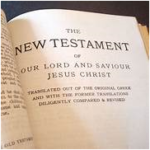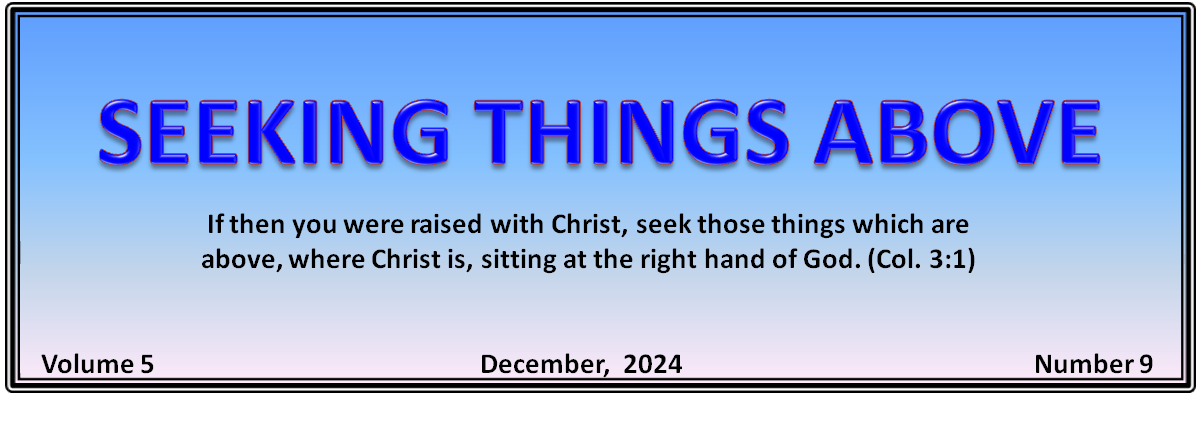HOW WELL DO YOU LISTEN?
Mike Johnson
 How well do you listen? We would not remember some of the most famous statements ever made if someone had not listened carefully to what was said. Listening correctly is very important to learning. One person put it like this: “Talk, and you say what you already know, but listen, and you learn something new.” A speaker needs to prepare his speech well and present it clearly. However, a good speaker must have a good audience to be effective.
How well do you listen? We would not remember some of the most famous statements ever made if someone had not listened carefully to what was said. Listening correctly is very important to learning. One person put it like this: “Talk, and you say what you already know, but listen, and you learn something new.” A speaker needs to prepare his speech well and present it clearly. However, a good speaker must have a good audience to be effective.
Jesus often challenged people by saying, “He who has ears to hear, let him hear!” (Mt. 11:15; 13:43; Mk. 4:9). On one occasion (Mt. 15:10), he said to a multitude He had called together, “Hear, and understand.” In the Parable of the Sower, the seed that fell on the good soil is described by one who hears the word, receives it, and brings forth much fruit (Mk. 4:20).
The importance of an audience being willing to listen and listen objectively can be illustrated by the two audiences of Acts 2 and 7. In Acts 2 (on the day of Pentecost), Peter was the speaker, while in Acts 7 (before the Jewish council), Stephen was the one who spoke. A close study of these two sermons will reveal that their basic message was the same. With both, the speaker tried to convince the people that they had rejected and crucified God’s son and that they needed to repent and become Christians. Consider the reaction to Peter’s sermon: “Now when they heard this, they were cut to the heart, and said to Peter and the rest of the apostles, ‘Men and brethren, what shall we do?’” (2:37) They were then told they needed to repent and be baptized (v. 38), and verse 41 shows their response as it says, “Then those who gladly received his word were baptized; and that day about three thousand souls were added to them.”
Stephen, on the other hand, got a very adverse reaction to his preaching in Acts 7. Instead of repenting, verse 57-58a says, “Then they cried out with a loud voice, stopped their ears, and ran at him with one accord; and they cast him out of the city and stoned him.”
What was the difference? Both Peter and Stephen preached basically the same message. The difference was the audience. One group was willing to objectively listen with a receptive heart while the other audience closed its ears.
Jesus often had very unreceptive audiences. He described the people of his day when he said of them, “And in them the prophecy of Isaiah is fulfilled, which says: ‘Hearing you will hear and shall not understand, And seeing you will see and not perceive; For the hearts of this people have grown dull. Their ears are hard of hearing, and their eyes they have closed, lest they should see with their eyes and hear with their ears, lest they should understand with their hearts and turn, So that I should heal them.” (Mt. 13:14-15). Isaiah and Paul applied this description to the people of their day in Isaiah 6:9-10 and Acts 28:26-27. This same concept applies to many people in our time.
What are the lessons for us? First, we must make sure that we are always receptive to God’s Word. We need to have a willingness to listen and to obey. It is surprising how many Christians are very closed-minded on many Bible subjects. We need to be like those of Berea, who the writer describes as nobler than those of Thessalonica, as they received the word with readiness of mind and searched the Scriptures daily to see if what Paul taught was true. Secondly, we must realize all who we teach will not obey. We should always try to improve our knowledge of the Bible and work on our presentation of God’s Word. However, we must remember that although some will obey, others will not. Some will be like those compared to the good ground in the Parable of the Sower (Mt. 13:8, 23). They will receive the word and bear fruit, while others will be like those compared to the wayside (Mt. 13:4,19) as they will be unreceptive. Therefore, we must not get discouraged when our efforts to teach others are unsuccessful. We must remember there are different kinds of soils and not get discouraged.
In conclusion, how do you listen to God’s Word? James 1:21 tells us how we should hear as the writer said, “Therefore lay aside all filthiness and overflow of wickedness, and receive with meekness the implanted word, which is able to save your souls.”
________
Why “Liberal” and “Conservative”
Churches of Christ
Robert Harkrider
 During the past two decades, many have asked this question. Some sincere brethren who have been caught up in one stream or the other never fully understood, and many who were too young before have now grown to adulthood wondering why. It is, therefore, a good question worthy of repeated investigation. Labels of “liberal” and “institutional” versus “anti” and “conservative” have been used by some as a prejudicial tool to halt further investigation. Labels used as prejudicial clubs are to be condemned, yet the terms “liberal” and “conservative” are proper when used as adjectives to describe a difference in attitude toward Bible authority and, consequently, a difference in practices. As the years go by, the attitude underlying the division becomes more apparent. We are not separated because one group believes in benevolence and the other does not, nor because of jealousy and envy. We have divided over a fundamental attitude toward the Bible:
During the past two decades, many have asked this question. Some sincere brethren who have been caught up in one stream or the other never fully understood, and many who were too young before have now grown to adulthood wondering why. It is, therefore, a good question worthy of repeated investigation. Labels of “liberal” and “institutional” versus “anti” and “conservative” have been used by some as a prejudicial tool to halt further investigation. Labels used as prejudicial clubs are to be condemned, yet the terms “liberal” and “conservative” are proper when used as adjectives to describe a difference in attitude toward Bible authority and, consequently, a difference in practices. As the years go by, the attitude underlying the division becomes more apparent. We are not separated because one group believes in benevolence and the other does not, nor because of jealousy and envy. We have divided over a fundamental attitude toward the Bible:
- A “liberal” attitude justifies any activity that seems to be a “good work” under the concept, “We do a lot of things for which we have no Bible authority.”
- A “conservative” attitude makes a plea to have Bible authority (either generic or specific) for all we do. Therefore, we refrain from involving the church in activities alien to that of the church in the New Testament.
Briefly, the walls of innovations which have divided us are built in three areas:
Who?
Who is to do the work of the church? The Church? Or a human institution? The church has a God-given work to do, and the Lord made the church sufficient to do its own work. Within the framework of elders and deacons, a local church is the only organization necessary to fulfill its mission of evangelism, edification, and benevolence (Ephesians 3:10-11; 4:11-16; I Timothy 3:15). However, a wedge was driven when some brethren began to reason that the church may build and maintain a separate institution – a different who – to do the work of the church. This separate institution is human in origin and control. It is not a church nor governed by the church, yet it receives financial maintenance from the church. Human institutions so arranged (such as benevolent homes, hospitals, colleges, or missionary societies) may be doing good work, but when they become leeches on the church, they deny its independence and all-sufficiency and make a “fundraising house” of this God-planned institution.
How?
How is the work of the church to be overseen? On a local basis with separate, autonomous congregations? Or may several local churches work as a unit through a “sponsoring eldership?” The organization of the New Testament church is local in nature, with elders limited to oversight of the work of the flock among them (Acts 14:23; 20:28; I Peter 5:2). We are divided by those who promote “brotherhood” works through a plan of inter-congregational effort with centralized oversight—an unscriptural how.
What?
What is the mission of the church? Spiritual or also social? It is in this area that the loose attitude toward the scriptures is becoming more apparent. Though wholesome activities are needed for all, the Lord died for a higher and holier mission than fun, food, and frolic. Let the church be kept free to spend its energy and resources on spiritual purposes (Romans 14:17; I Peter 2:5), and let the home be busy in providing social needs (I Corinthians 11:22, 34).
__________
Is the New Testament a Law?
Jonathan Perz
 The Bible is undeniably divided into two key sections—the Old Testament and the New Testament. This division is described in the Bible in various ways, some literally and some figuratively. One such contrast is seen when the Bible refers to the Old Testament as the “Law of Moses” (cf. John 7:23, et al.) and the New Testament as the “Law of Christ” (cf. Galatians 6:2).
The Bible is undeniably divided into two key sections—the Old Testament and the New Testament. This division is described in the Bible in various ways, some literally and some figuratively. One such contrast is seen when the Bible refers to the Old Testament as the “Law of Moses” (cf. John 7:23, et al.) and the New Testament as the “Law of Christ” (cf. Galatians 6:2).
For many, considering the idea of the New Testament as “a law” is a challenge. Such terminology flies in the face of those who prefer to view the New Testament as more of a history or a set of guidelines and principles and not as a binding law or set of obligations to be adhered to and followed. This idea is so abhorrent to some that those who would consider any of the New Testament as a law are often derided as “legalists.”
Therefore, we ask, is the New Testament a divine law given by the Lord that must be followed and obeyed?
I firmly believe that the New Testament should be viewed as a law, with precedents and evidence that clearly must be adhered to. It may also be considered a history. There are clear principles taught in it. It is also a set of doctrines. Yet clearly, it is a law unto those who would follow Christ (Christians – Acts 11:26), as the words of Moses were a law unto the Jews. This is not based on any subjective reasoning but, quite simply, the straightforward declarations of inspired men (cf. I Peter 4:11).
To the brethren in Galatia, Paul wrote, “Bear one another’s burdens, and so fulfill the law of Christ” (Galatians 6:2). Whether this is in reference to a singular instruction of Christ or the whole of Christ’s instructions, it still refers to it as the law of Christ. “Law” comes from the Greek word nomos, which refers to the body of Christ’s teaching, general law, and Moses’ law. Even Christ Himself used this word to refer to the Old Covenant (particularly Moses’ teaching — see Matthew 5:17-18). This tells us that context is critical to discern what law is referenced in any passage. We must discern which law a passage has in mind before drawing any conclusions from that passage, lest we wrongly divide the word of truth (II Timothy 2:15). Paul’s words to the brethren in Galatia also tell us that the Holy Spirit, through the inspired writers, thought of Christ’s teaching as a law.
Much has been said to deny the existence of keeping a law from the book of Romans, however Paul also referred to Christ’s doctrine as a law in and of itself within that body of writing. Contrasting the law of Moses with Christ’s law, he wrote, “There is now no condemnation to those who are in Christ Jesus, who do not walk according to the flesh, but according to the Spirit. For the law of the Spirit of life in Christ Jesus has made me free from the law of sin and death” (Romans 8:1-2). Paul refers to Christ’s doctrine as “the law of the Spirit of life in Christ Jesus” and contrasts it from “the law of sin and death.” Again, the Greek word translated law here is nomos and clearly has the New Testament in view.
Again, in contrasting the keeping of the law of Moses with Christ’s teachings, Paul asks the rhetorical question, “Where is boasting then? It is excluded. By what law? Of works? No, but by the law of faith?” (Romans 3:27). What law does he have in view as he refers to “the law of faith” if not the “law of Christ” he referred to in other places?
James uses another term to describe Christ’s doctrine, in contrast to the law of Moses. He writes, “If you really fulfill the royal law according to the Scripture, “You shall love your neighbor as yourself,” you do well; but if you show partiality, you commit sin, and are convicted by the law as transgressors. For whoever shall keep the whole law, and yet stumble in one point, he is guilty of all. For He who said, “Do not commit adultery,” also said, “Do not murder.” Now if you do not commit adultery, but you do murder, you have become a transgressor of the law. So speak and so do as those who will be judged by the law of liberty” (James 2:8-12). Observe that James referred to Christ’s teaching as “the law of liberty,” a reference he used earlier, reminding us to look into “the perfect law of liberty” and continue in it (James 1:25). Not only does James refer to it as a law, he tells us we will be judged by it. Jesus Himself said, “He who rejects Me, and does not receive My words, has that which judges him—the word that I have spoken will judge him in the last day” (John 12:48).
Writing to the brethren in Corinth, Paul said, “For though I am free from all men, I have made myself a servant to all, that I might win the more; and to the Jews I became as a Jew, that I might win the Jews; to those who are under the law, as under the law, that I might win those who are under the law: to those who are without law, as without law (not being without law toward God, but under law toward Christ), that I might win those who are without law; to the weak I became as weak, that I might win the weak. I have become all things to all men, that I might by all means save some. Now this I do for the gospel’s sake, that I may be partaker of it with you” (I Corinthians 9:19-23). Observe Paul’s parenthetical aside where he plainly declares he is “under law toward Christ.” What law does he have in reference? What law is he under if not Christ’s law?
Time and again, the body of writing and teaching known as the New Testament is referred to as many things. Among those things, it is referred to as a law by inspiration. As part of “all scripture,” it is profitable for doctrine and instruction in righteousness, among other things (II Timothy 3:16-17). To ignore the lawful, legal, and binding aspects of Christ’s covenant is one and the same as accepting Jesus as your Savior but ignoring Him as your Lord. The two simply go hand-in-hand. If there was no law today, there would be no sin (I John 3:4). So be careful not to merely view Christ’s teaching as a set of guidelines, principles, and mantras, but acknowledge it as the apostles and first-century saints did — as the law that every citizen in the Kingdom of Heaven must obey. Let us be careful to rightly divide every passage that references the law, to be certain that we have the correct law in view as we understand what we are to follow and what we do not have to follow.
__________
Preach a Sermon Preacher

Preach a sermon preacher but make it short and sweet;
Our stomachs strike at twelve o’clock a hungering for to eat.
Preach a sermon preacher with words so smooth and fair;
For philosophy and theory we are thirsting; for scripture we don’t care.
Preach a sermon preacher, punctuate it with jokes;
Fill it with your yarns and tales and entertain us folks.
Preach a sermon preacher, we don’t care what you say,
As long as you leave us all alone and fire the other way.
Preach a sermon preacher and don’t get too specific;
As long as you generalize, we think you are terrific.
Preach a sermon preacher, make it good and plain,
But don’t you dare get so close as to call sin by its name.
Preach a sermon preacher and preach it round or flat;
We love to play at hide-and-seek and guessing where you’re at.
Preach a sermon preacher, make it what we love to hear;
We’ll pat you on your spineless back while you scratch our itching ears.
(Hugh Davis)
Note Also: “In the presence of God and of Christ Jesus, who will judge the living and the dead, and in view of his appearing and his kingdom, I give you this charge: Preach the Word; be prepared in season and out of season; correct, rebuke and encourage — with great patience and careful instruction. For the time will come when men will not put up with sound doctrine. Instead, to suit their own desires, they will gather around them a great number of teachers to say what their itching ears want to hear. They will turn their ears away from the truth and turn aside to myths.” NIV (2 Tim. 4:1-4)
__________
What Then?
David Sain
 On graduation night, a father asked, “Son, what are your plans?” The boy answered, “Dad, you know that I’m going to college.” The dad said, “That’s right, but what then?” The boy replied, “Well, I’ll want to get a good job and hopefully get married.” The dad said, “That’s also fine, but what then?” The boy answered, “I want to have kids. Then, after that, I will put the required years on the job and retire.” The father replied, “That’s good, but what then?” And the boy said, “Well…uh…I don’t know…I guess I’ll get old and die.” The dad said, That right, when then?” And the boy dropped his head as he realized he had plans for life on earth but no plans for life beyond this world. The Bible teaches that it is appointed unto man once to die, and after this, the judgment (Hebrews 9:27). What then?
On graduation night, a father asked, “Son, what are your plans?” The boy answered, “Dad, you know that I’m going to college.” The dad said, “That’s right, but what then?” The boy replied, “Well, I’ll want to get a good job and hopefully get married.” The dad said, “That’s also fine, but what then?” The boy answered, “I want to have kids. Then, after that, I will put the required years on the job and retire.” The father replied, “That’s good, but what then?” And the boy said, “Well…uh…I don’t know…I guess I’ll get old and die.” The dad said, That right, when then?” And the boy dropped his head as he realized he had plans for life on earth but no plans for life beyond this world. The Bible teaches that it is appointed unto man once to die, and after this, the judgment (Hebrews 9:27). What then?
____________________________________________
Sermon
Audio
Donnie Rader
====================================================
Editor: Mike Johnson
www.seekingthingsabove.org


